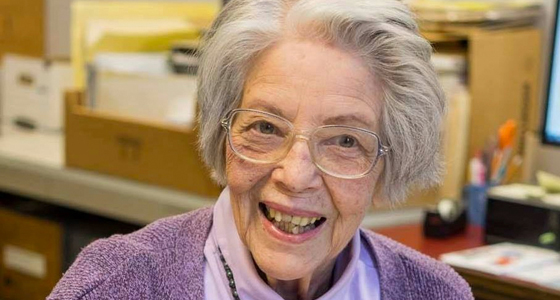We are saddened by the passing of Joy Emery on Sept. 7, 2018, just three days before her birthday after a long fight with cancer. She was lively and still working on her costume archive and having dinner with friends up to the week before she went back into the hospital.
Joyce Spanabel Emery, warmly known to many of us as Joy, was a strong and constant supporter of USITT as a former Costume Commissioner and Vice President for Communications. Many remember Joy Emery’s speech to the USITT convention in Boston in 1991 as the first female to deliver the Fellows Address. When she spoke about the challenges that we face in society and the apparent and clear prejudices that we uniquely face as women, as people of color, as artists and as craftspeople, that same speech could be delivered today: Lack of equal employment opportunities; lack of pay equity; sexism in promotion practices; sexual harassment; Inadequate employer child care policies; inadequate maternity leave policies; and under-representation of women in most areas of technical theatre. Fortunately, she lived long enough to see some of that change finally coming about. She was always a clear spokesperson for artists in academia and the need to reinforce a respect for the scholastic work of theatre artists. Joy Emery was inducted as a Fellow of the Institute in 1987 by Sarah Nash Gates.
Joy was also a long-standing member of the Costume Society of America (CSA), a former President and a Fellow of that institution and very active with the New England Theatre Conference (NETC).
Joy was born in Akron, Ohio, on Sept. 10, 1936, received her undergraduate degree from Kent State and earned her Master of Fine Art’s degree in Costume Design from Ohio State University. Ultimately, she joined the faculty at the University of Rhode Island. She was a popular and generous teacher who cared deeply for her students and who approached every venture with energy and determination. She designed 83 productions as the resident costume designer for the University and forged a strong curriculum in Costume Design. Several former students mention their first real knowledge of history coming through Joy’s lectures in costume history, and one student came to realize that she was to be a costume designer rather than an actress while learning to create character costumes. Joy acted as Chair of the Theatre Department for a short while before retiring in 2000 to work full time on her pattern archive.
The Commercial Pattern Archive (CoPA, for short) is housed in Special Collections at the Robert L. Carothers Library on the University of Rhode Island campus. In the late-80s and early-90s, Joy came up with the idea for CoPA along with her dear friend and pattern enthusiast Betty Williams. After Betty’s death, Joy was able to continue, develop, and realize the project. It was through Joy’s determination to preserve the history of the home sewing pattern, that CoPA grew to approximately 56,000 entries (the oldest from 1847). The Archive is made up of many aggregate collections and donations, making it the largest collection of commercial sewing patterns in the world. Joy’s knowledge of the industry and the collection was so vast, that companies who produced the patterns she collected, would regularly contact her for their own history. A prolific scholar, Joy authored numerous essays and articles and, notably, two books; Stage Costume Techniques, published in 1981, and A History of the Paper Pattern Industry, published in 2014. Her scholarship and tireless work on CoPA plus her dedication to the organization earned Joy Emery the Distinguished Achievement Award in Costume Design and Technology from USITT in 2016.
Joy loved to travel and went on many USITT-sponsored tours enjoying them all. Family was important to Joy, and she spent a lot of time with her son Christopher R. Spanabel and his wife, Sara Kaplow, and doting on her granddaughter Maya Rose Spanabel of West Kingston, Rhode Island.
In lieu of flowers, memorial donations may be made to the Joy Spanabel Emery Endowment Fund, c/o Rhode Island Foundation, One Union Station, Providence, RI 02903. If it’s more convenient, donations can be made electronically by going to: www.rifoundation.org. The fund is to continue to keep an archivist employed to receive and catalog future pattern donations for CoPA.
